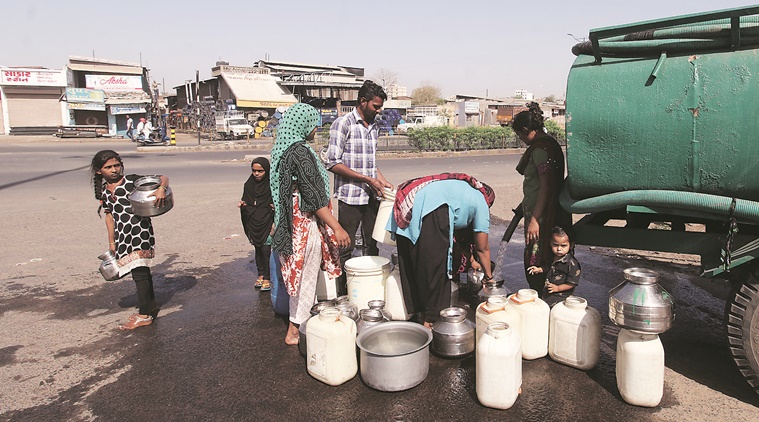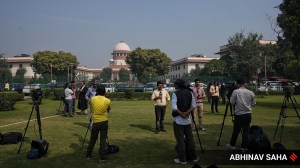- India
- International
Forced to stay back, lakhs of migrants in cities unclear how to access rations
In suburban Mumbai’s Santacruz, for example, where thousands of migrant workers live in shared rented spaces, men from Adilabad were worried about running out of rations through the last few days until good samaritans stepped in Sunday and helped them with bags of rice and lentils.
 In just the Hinjewadi-Pimpri-Chinchwad-Gultekdi areas of suburban Pune, Kumar said, his union is in touch with nearly 1,000 families who need the rations urgently, having lost incomes for over a week now. (File)
In just the Hinjewadi-Pimpri-Chinchwad-Gultekdi areas of suburban Pune, Kumar said, his union is in touch with nearly 1,000 families who need the rations urgently, having lost incomes for over a week now. (File)
For lakhs of migrant workers in Maharashtra, lack of clear information has continued to cause anxiety, especially after the Centre and state governments issued instructions Sunday to prevent them from attempting to return to their native places. Their biggest concern being accessible accommodation and food for the remainder of the 21-day lockdown period.
“What’s going to happen will be reminiscent of the Bengal famine — there is food available but no access to it,” said Chandan Kumar of the Angmehnati Kashtakari Sangharsh Samiti, an umbrella organisation representing construction labourers, casual labourers, waste-pickers, domestic workers, head-loaders and other unorganised workers.
“The simplest way to ensure access to food is to provide universal access to the Public Distribution System (PDS) supplies through the ration shops, for those who have or do not have ration cards. The government should provide the PDS rations to all migrant workers — many are seasonal migrants and do not have ration cards here in the cities, some are anyway left out of the PDS system entirely,” he told The Indian Express. “Not everybody can travel to a camp for migrant workers, because there is no mobility in the absence of public transport and many fear being hit by the police on their way there.”
In just the Hinjewadi-Pimpri-Chinchwad-Gultekdi areas of suburban Pune, Kumar said, his union is in touch with nearly 1,000 families who need the rations urgently, having lost incomes for over a week now.
In Mumbai, Sanjay Shinghvi of the Trade Union Centre of India fielded multiple calls through Sunday from migrant workers in several big cities who were unclear about where or how to access food. “Where have they publicised these locations where rations will be available? Where is the communication to the migrant workers regarding what they are to do now?” he asked.

A list of district collectors and contact numbers that was published earlier is inadequate for the lakhs who have to be assisted immediately, Shinghvi said. While providing dry rations is the best option, he said, if food packets are to be distributed, these too have to be made accessible through wide publicising and localised availability. The state government also appears to have no estimation of how many workers will require food or where they are located, he added.
In suburban Mumbai’s Santacruz, for example, where thousands of migrant workers live in shared rented spaces, men from Adilabad were worried about running out of rations through the last few days until good samaritans stepped in Sunday and helped them with bags of rice and lentils. “We were being asked to vacate our rented accommodation, and we were running out of supplies also,” said Pavan Kumar, one of a group of 10. Anxious about his wife and children back home, he believed that the lockdown could last much longer than 21 days because of the news that rations for three months would be made available. However, he had no information on how to access PDS rations in Mumbai, where he works as a casual labourer.
Shweta Damle of the Habitat and Livelihood Welfare Association said seeking any kind of identification papers from workers who need rations could cause lakhs to be left out, while adequate messaging and communication regarding where and how to access the supplies appears missing, until now at least. “What migrant workers need right now is the universalisation of foodgrain, seeking one or none out of a basket of documents and clear directives from the government on how to access this,” she said.
A group of handcart pullers in Colaba had gone without food for two days until a resident provided them a meal Sunday, she said, adding that such workers are often not affiliated to any union or association, may not have a network that provides them with any information and will require a more proactive administration to ensure that they are able to access any aid.
Apr 26: Latest News
- 01
- 02
- 03
- 04
- 05








































